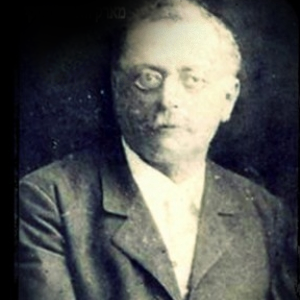Mark Markovich Warshawsky (Varshavsky) (Russian: Марк Маркович Варшавский, Yiddish: מאַרק וואַרשאַווסקי; 26 November 1848 – 1907) was a Yiddish-language folk poet and composer.
Born in Odessa into an Ashkenazi Jewish family, he moved with his family as a child to Zhitomir, where he later attended the four-year state rabbinical school. After that he studied law at Odessa University for one year, then completed his studies at Kiev University, and went on to practice law in Kiev. He practiced law throughout his life, barely managing to make a living. In 1903 he moved to Belgium to work as a legal adviser for a firm there; upon falling ill in 1905, he returned to Kiev, where he died two years later.
By the influence of Abraham Goldfaden, Warshawsky started to write songs and sing them in his circle of friends accompanied by a fortepiano. He did not take seriously his musical work and never recorded those songs, relying on his memory. Many of his works in this way were spread throughout the Jewish community of the Ukrainian region of the Russian Empire and most of them were simply adopted as folk songs.
In 1890 Warshawsky met with Sholem Aleichem. After listening to his songs, Sholem Aleichem wrote “I simply hugged him and kissed him!” And then,
Villain! Why do not you print such songs? If I would not know that those are your own songs, I would swear that I heard them sometime performed by my mother!
Later, by Aleichem’s full cooperation, Warshavsky published his first collection, Yiddishe Volkslider (Jewish People’s songs, Kiev, 1900) with a heartily foreword from the great classic. That book was republished not only in Russia, but abroad as well. The collection included such songs as Der Alef-Beis (commonly known as Oyfn Pripetchik), A Brif fun Amerike, Der Zeide mit der Babe. The songs described the everyday life of Jews in the Russian Empire.
Together Sholem Aleichem and Warshawsky started to tour around Russia performing their own repertoire. They also had plans to travel to the United States, however those plans were left unfulfilled as Warshawsky suddenly became ill and died on November 26. The second edition of the Warshawsky’s songs was published in Odessa in 1914, with the following exclusively abroad: New York (1948) and Buenos-Aires (1958).
According to Prilutsky, Warshawsky spoke in the authentic dialect spoken in Volyn.


12 thoughts on “Kaminos”
Was Nicholas related to Alexander Saslavsky who married Celeste Izolee Todd?
Anyone have a contact email for Yair Klinger or link to score for Ha-Bayta?
wish to have homeland concert video played on the big screen throughout North America.
can organize here in Santa Barbara California.
contacts for this needed and any ideas or suggestions welcomed.
Nat farber is my great grandpa 😊
Are there any movies or photos of max kletter? His wife’s sister was my stepmother, so I’m interested in seeing them and sharing them with his wife’s daughter.
The article says Sheb recorded his last song just 4 days before he died, but does not tell us the name of it. I be curious what it was. I’d like to hear it.
Would anyone happen to know where I can find a copy of the sheet music for a Gil Aldema Choral (SATB) arrangement for Naomi Shemer’s “Sheleg Al Iri”. (Snow on my Village)?
Joseph Smith
Kol Ram Community Choir, NYC
Shalom Joseph. I just saw your 2024 post by chance… I’m a mostly-retired Israeli journalist and translator. In 2003 I translated into English the content (the objective was to remain true to the meaning, not to cadence or rhyme) of poems and lyrics of 48 of Israel’s most iconic songs arranged by Aldema for choirs abroad singing in Hebrew (the words in the scores are transliterated) but members of the choir lack mastery of Hebrew to ‘know’ exactly what they are saying/singing… The book was titled in English “A Merry Choir” – in Hebrew מקהלה עליזה . See if you can find a copy in a used book store, it is priceless and apparently out-of-print – well worth the search. If not, they may have a copy at Tel Aviv Amenu Museum’s music department – write them and see if they can send it to you. Or – if you will contact me via Whatsapp – (972) 546872768 or via my email – I will try and find the book (it is not where it ‘should be’ so I have to search) and I will photograph the score with my cell and send to you as an attachment. Best, Daniella Ashkenazy – Kfar Warburg.
שלום שמעון!
לא שכחתי אותך. עזבתי את ישראל בפברואר 1998 כדי להביא את בני האוטיסט לקבל את העזרה המקצועית שלא הייתה קיימת אז בישראל. זה סיפור מאוד עצוב וטרגי, אבל אני הייתי היחיד עם ביצים שהביא אותו והייתי הורה יחיד בשבילו במשך חמישה חודשים. הוא היה אז בן 9. כעת הוא בן 36 ומתפקד באופן עצמאי. נתתי לו הזדמנות לעתיד נורמלי. בטח, אבות כולם חרא, אומרים הפמינציות, אבל כולם צריכים לעבוד כמטרות במטווחי רובה!
משה קונג
(Maurice King)
Thank you for this wonderful remembrance of Herman Zalis. My late father, Henry Wahrman, was one of his students. Note the correct spelling of his name for future reference. Thank you again for sharing this.
Tirza Wahrman (Mitlak)
amazing zchuso yagein aleinu, he wrote the famous niggun Lefichuch that is sung in almost every Israeli Yeshiva
My grandmother, Rose Ziperson, wrote the words to his music for a song called Main Shtetele, which he produced. I have the sheet music!